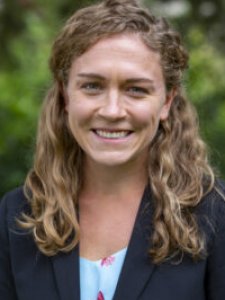What is your area of expertise and what is your research focus?
I study human-environmental interactions at the intersection of environmental and development economics. I am interested in applications related to environmental health, water and sanitation, air pollution, human capital accumulation, and water resource management.
How did you end up in STEM?
During college, I had the opportunity to work with an interdisciplinary team of economists, engineers, and environmental scientists on a project examining household water use behavior in Bangladesh. While I was already interested in environmental and development economics, this experience motivated me to pursue it further—to graduate school, and in my career.
What hurdles or challenges (big or small) did you find as you pursued your career in STEM? What challenges do you face today?
The biggest challenge I have found pursuing my career has been in accessing the data I need to examine the questions in which I am interested. It can be difficult to find relevant secondary data, especially for more remote areas of the world, and collecting one’s own data requires time and financial resources. In the last two years, uncertainties and travel restrictions due to COVID-19 have made this especially challenging.
What or who was an inspiration or support for you?
I have been very lucky to have wonderful, supportive academic mentors who played instrumental roles in helping me find opportunities for pursuing my work.
Why is it important for women to be in STEM and specifically your field?
It is important for women to be in economics because the best work is done when multiple perspectives are heard. Too often, we base our decisions on the loudest or most common voice in the room; hearing diverse perspectives is essential for conducting the best science—and making sure that science makes its way into decisions and policymaking.
What can be done to recruit more women into STEM?
Representation matters, and so one way to recruit more women into STEM is to make sure, from early on, young girls see STEM fields as viable opportunities for study and careers. In addition, I think mentorship programs (at many different stages) can play a valuable role in both recruiting women into STEM as well as retaining them in their fields.
What advice would you give to girls and young women going into STEM?
I would encourage girls and young women going into STEM to follow their passions. There will likely be challenges along the way, but being able to work on topics in which you are deeply interested can make it worthwhile to persist past them. I would also encourage them to find mentors and advocates so that when they face challenges, they have a strong support system on which to rely.

